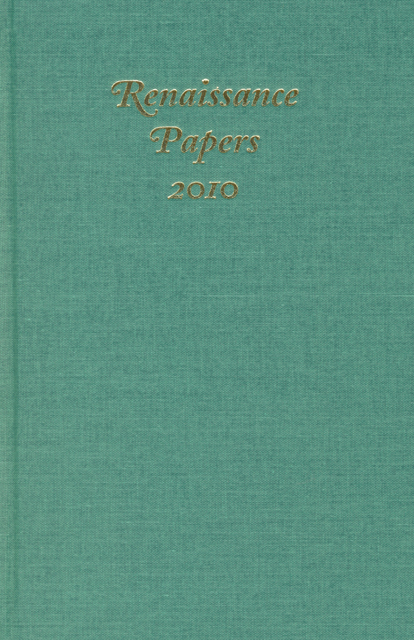Book contents
- Frontmatter
- Contents
- Renaissance Papers
- Aretino’s Life and His Afterlife in England
- Mixing Genres in George Peele’s David and Bethsabe
- Royal Prerogative versus the Common Law in A View of the Present State of Ireland and The Faerie Queene, Book 5
- The Limits of Clowning in the Age of Marprelate: The Anti-Martinist Tracts and 2 Henry VI
- Shakespeare’s Iago
- Francesco Patrizi da Cherso, Caravaggio, and the Metaphysics of Light
- Being John Donne in 1602
- The Problem of the Human in Sir Francis Bacon
- The Glamorous Echoes of Godly Print
- “More cullors than the Rainbowe caries”: Catholics, Cosmetics, and the Aesthetic Economy of Protestant England
Being John Donne in 1602
Published online by Cambridge University Press: 10 February 2023
- Frontmatter
- Contents
- Renaissance Papers
- Aretino’s Life and His Afterlife in England
- Mixing Genres in George Peele’s David and Bethsabe
- Royal Prerogative versus the Common Law in A View of the Present State of Ireland and The Faerie Queene, Book 5
- The Limits of Clowning in the Age of Marprelate: The Anti-Martinist Tracts and 2 Henry VI
- Shakespeare’s Iago
- Francesco Patrizi da Cherso, Caravaggio, and the Metaphysics of Light
- Being John Donne in 1602
- The Problem of the Human in Sir Francis Bacon
- The Glamorous Echoes of Godly Print
- “More cullors than the Rainbowe caries”: Catholics, Cosmetics, and the Aesthetic Economy of Protestant England
Summary
John Donne’s 1601 marriage to the daughter of Sir George More, laments Izaak Walton in his Protestant hagiography, was “the remarkable error of his life.” Only the “mutuall affection, [which] made their bread of sorrow taste more pleasant than the banquet of fooles, might be urged,” he says, “to moderate a severe censure” of Donne’s error. In fact, asserts Walton, Donne himself “never seemed to [have] justifie[d] the flattering mischief [of this] passion”—even though he had “a wit apt enough, and [was] very able to make paradoxes.” I wish to “moderate” Walton’s “severe censure” of the clandestine 1601 marriage by considering (not entirely facetiously) that Donne’s “remarkable error” was not his marriage but his 2 February 1602 letter to Anne’s father—in which he employed his “apt wit” and “paradoxes” not so much to “justifie” as to assert “bold[ly]” his (and Anne’s, but mostly his own) conduct. The following reading of Donne’s letter to Sir George aims to supplement recent biographical discoveries and “reasonable conjectures” in order to suggest how this “remarkable” epistle reveals more about Donne than has been limned.
The letter begins with that most familiar favorite of Donne’s love poems—“If ”—initiating the false syllogism of the opening exordium, in which Donne amidst his “humble” plea insinuates that it is actually Sir George’s fault that has kept him from “waiting upon you myself to have given you truth and clearness of this Matter between your daughter and me.” A “very respective fear of your displeasure, [and] anger,” he submits, and Egerton’s “lov[ing] compassion” for your passion (ours goes unmentioned, of course) has so severely “increase[d] my sickness as that I cannot stir.” The faults not of John and Anne but of her father, that is, have forced this letter to assume “the boldness” that the absent author claims he would have assumed himself if he were not rendered so sick, doubtful, and apparently procrastinating because of his fear of explaining “plainly” to Sir George “the limits of our fault” and of attempting to convince Anne’s “wise” father to “proportion the punishment” that the exordium and the remainder of the letter itself attempt to mitigate (and eventually to dismiss as antithetical to “th[ose] persuasions of Nature, Reason, Wisdom, and Christianity” that would incline Donne “to show [his] humble obedience” to Sir George).
- Type
- Chapter
- Information
- Renaissance Papers 2010 , pp. 87 - 96Publisher: Boydell & BrewerPrint publication year: 2011

